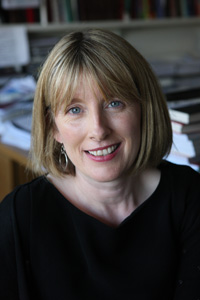Fionnuala Ni Aolain
 Professor Fionnuala Ni Aoláin
Professor Fionnuala Ni Aoláin
Professor of Law & United Nations Special Rapporteur
Queen's University Belfast
Bio
Professor Fionnuala Ní Aoláin is concurrently Regents Professor and Robina Professor of Law, Public Policy and Society at the University of Minnesota Law School and Professor of Law at Queen's University Belfast, Northern Ireland. Professor Ní Aoláin is the recipient of numerous academic awards and honors including the Leverhulme Fellowship, Fulbright scholarship, the Alon Prize, the Robert Schumann Scholarship, a European Commission award, and the Lawlor fellowship. She has published extensively in the fields of emergency powers, conflict regulation, transitional justice and sex-based violence in times of war.
She has been a visiting scholar at Harvard Law School (1993-94); an Associate-in-Law at Columbia Law School (1994-96); a Visiting Professor at the School of International and Public Affairs, Columbia University (1996-2000); an associate Professor of Law at the Hebrew University in Jerusalem, Israel (1997-99); a Visiting Fellow at Princeton University (2001-02), Visiting Fellow at the Institute of Advanced Studies of the Hebrew University in Jerusalem (2011-2012) and Visiting Professor at Harvard Law School (2012-13). Professor Ní Aoláin is currently the United Nations Special Rapporteur on the Protection and Promotion of Human Rights while Countering Terrorism (2017-).
Previously, she was a representative of the prosecutor at the International Criminal Tribunal for the Former Yugoslavia at domestic war crimes trials in Bosnia (1996-97). In 2003, she was appointed by the Secretary-General of the United Nations as Special Expert on promoting gender equality in times of conflict and peace-making. In 2011, she was appointed as consultant jointly by the Office of the High Commissioner on Human Rights and UN WOMEN to prepare a Study on Reparations for Conflict Related Sexual Violence.
Ní Aoláin has been nominated twice (2004 and 2007) by the Irish government to the European Court of Human Rights, the first woman and the first academic lawyer to be thus nominated. She was appointed by the Irish Minister of Justice to the Irish Human Rights Commission in 2000 and served until 2005. She remains an elected member of the Executive Committee for the Belfast-based Committee on the Administration of Justice and is also a member of the Irish Council for Civil Liberties. She was chair and member of the International Women’s Program Board at the Open Society Foundations (2010-2017).
TEDx Talk Title
Ending Counter-Terrorism as we know it
Overview of TEDx Talk
In the twenty years since the terrorist attacks of September 11th 2001, states and transnational bodies have gained extensive powers with the stated aim of combating terrorism and regulating extremist groups. These powers have reshaped the internal architecture of the United Nations, reframed regional organizations and priorities and empowered the security sector in many countries. The result has not been the end of terrorism but rather a vicious cycle in which ‘more’ repressive counter-terrorism and security practices have pervaded every pore of international and national regulation and an ever- increasing upsurge in violent by terrorist and non-state actors groups around the globe. In many parts of the world, governance is led by security, and counter-terrorism is a primary regulatory practice by states to regulate all facets of daily life.
The result is the securitization of everything. The result is shrinking civic space across the globe, restrictions on fundamental human rights, including expression, assembly, freedom of religion and belief, family life, fair trial, political participation and more.
As we approach to 20th anniversary of 9/11 it is fundamentally time to ask, “does any of this work”? What have we lost in the past two decades? How might we address the root causes of terrorism and how might we build resilient, engaged, accountable and transparent societies capable of engaging all its disparate populations and communities. This talk with argue that it is time to ‘undo’ global counter-terrorism as we know it, and go back to basics.